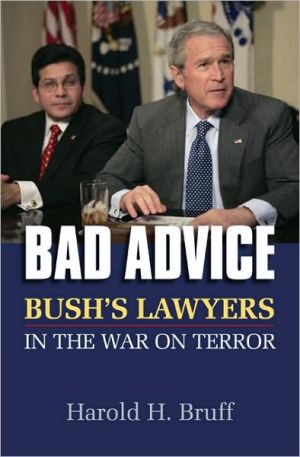

 |

|

The average rating for Bad Advice: Bush's Lawyers in the War on Terror based on 2 reviews is 3 stars.
Review # 1 was written on 2010-03-12 00:00:00 Robert Varady Robert Varadyseems to be eye-scorching stuff... |
Review # 2 was written on 2010-08-22 00:00:00 Elizabeth Garlich Elizabeth GarlichNatan Sharansky knows more about resisting tyranny than most, having been incarcerated in a prison of one of history's greatest tyrannies-the Soviet Union, as he illustrated in his incredible memoirs Fear No Evil: The Classic Memoir of One Man's Triumph over a Police State In this book he puts under the microscope the totalitarian states of the world, dissecting the inner workings of fear societies. Sharansky contrasts fear societies with free societies. The profound moral difference between a free society and a fear society, as Sharansky shows us, is that people in free societies can publicly express their own ideas and persuade people to accept these ideas as well. Sharansky points out that "moral clarity provides us with a place to stand, a reference point from where to leverage our talents, energies and ideas to create a better world. Without moral clarity, without a referewnce point, those same talents, ideas and energies are just as likely to do harm as good...A world without moral clarity is a world in which dictators speak of human rights even as they kill thousands, tens of thousands, hundreds of thousands, millions, tens of millions, even hundreds of millions of people. It is a world in which the only democracy in the Middle East is percieved as the greatest violator of human rights in the world. It is a world in which a human rights conference against racism, such as the one that took place in Durban, South Africa a few years ago, can be turned into a carnival of hate". Sharansky reminds us that there has never been a war between two democracies. He attacks those who believe that democracy cannot work in certain countries, pointing out that the same was said about Germany and Japan during and just after the Second World War. Today Germany and Japan are among the world's strongest democracies and human rights societies in the world. Sharansky also condemmns the distortions by the world media, painting the masses in tyrannies such as that of Saddam Hussein in Iraq, and the Taleban in Afghanistan, as being contented. He compares this to leftist intellectuals in the West who praised the Soviet Union as a paradise on earth at a time when Stalin was killing tens of millions of men, women and children. While Sharansky is hopeful for an eventual peace settlement betwen Israel and the Palestinian Arabs, he is adamant that this must be tied to improvements in human rights and basic freedoms in Palestinian society. He condemmns the Oslo Process for strengthening and attempting to appease the mass murderer and tyrant Yasser Arafat and his ruthless terror network. He points out how the human rights principles that once guided him in the Soviet Union remain the cornerstone of his approach to the peace process, that a neighbour who tramples the rights of his own people will eventually threaten the rights of the author's people, and that the only way to create Arab-Israeli reconciliation is to press the Arab world to protect human rights. Sharansky reminds us that those who hoped for a quick fix to the conflict should not have been surprised when the Oslo process collapsed and Arafat began his war of terror against the Israeli people. For seven years Arafat had been doing what all dictators do, using his power not to promote peace and better the lot of the Palestinian Arabs but rather to turn the Palestinian Arabs into a battering ram against the Jewish State. Money allocated to improve the Palestinian Arab's living standards was diverted to support a vast network of terror. "By allowing and often encouraging Arafat to create a fear society, a peace process that should have been steadily reducing a century old animus had instead exacerbated it". Sharansky stresses that he is not opposed to legitimate criticism of Israel's policies. However to distinguish legitimate criticism from anti-Semitism he has come up with what he calls the 3 D Test. If the criticism of Israel contains demonization of the Jewish State, double standards against the Jewish State, or delegitimization of the Jewish State, then it certainly can be termed anti-Semitic. Sharansky believes that bthe war between the Jews and the Arabs is not a tribal war but a part of the first world war of the 21st century between the world of democracy and the world of terror. Leftwing extremists who support tyranny ands terror and who do not want people to be free, will of course try to rubbish the book. But for true lovers of freedom and human rights, this is an essential guide to understanding the great struggle we are faced with at the beginning of the 21st century. |
CAN'T FIND WHAT YOU'RE LOOKING FOR? CLICK HERE!!!